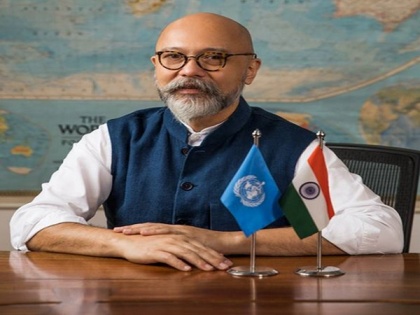WHO hails Gujarat for responding to second wave of COVID-19
By ANI | Published: February 11, 2021 09:23 PM2021-02-11T21:23:21+5:302021-02-11T21:30:02+5:30
As Gujarat conducted the Intra-Action Review (IAR) in December 2020 for its COVID-19 preparedness and response, World Health Organisation (WHO) country representative to India, Dr Roderico Ofrin on Thursday lauded the efforts by the state government in countering the second wave of the virus with the help of this mechanism.

WHO hails Gujarat for responding to second wave of COVID-19
As Gujarat conducted the Intra-Action Review (IAR) in December 2020 for its COVID-19 preparedness and response, World Health Orgsation (WHO) country representative to India, Dr Roderico Ofrin on Thursday lauded the efforts by the state government in countering the second wave of the virus with the help of this mechsm.
"Hats off to Gujarat government to take this review on pandemic as something to provide better information and tweak the response which they have especially during the second wave. Gujarat is one of the best performing states in vaccinations. It would be great if other states also start doing the same review exercise of their response," Ofrin exclusively told .
He also added that the state had a coronavirus safe workplace policy early on protecting the businesses and workers. The key findings from the review can help in future preparedness for any emergency not just for COVID-19 but also for any possible outbreak or even emergency from a natural disaster.
Talking about the steps taken by the Gujarat government during the pandemic, Ofrin said house-to-house surveillance was the key for better contact tracing.
"In Gujarat, there was house to house surveillance for better contact tracing that was key to find out the extent of how the infection is spreading. Second is the outreach of the medical services to provide medicine to people because of the lockdown access to health services needed to continue," he said.
Ofrin also said that another big innovation was addressing mental health through the digital academy.
Speaking about the IAR he said, "This report is called Intra-action for COVID-19 response for countries to be able to review for what they have done and they can tweet the responses to the pandemic. This is a longer outbreak than we expected. Usually, for any emergency, we do an after-action review so the state and ministry of health together with WHO, IIM Ahmedabad and Indian Institute of Public Health, Gandhinagar got together including all stakeholders with 75 interviews and 35 orgsations."
According to the report, the review will use a new WHO tool developed for country intra-action reviews. Its report will highlight important success factors and provides recommendations across 10 important areas of the country's national and sub-national response.
The review also documents the challenges that the stakeholders faced while dealing with the outbreak and recommends critical improvements required to ramp up the health response.
The entire IAR process was planned and implemented in three phases and given that the country is a large country with a complex federal structure.
The reports also stated that Gujarat has taken the lead in conducting the first state-level IAR in India. The entire COVID-19 response was led by the leadership of Chief Minister Vijay Rup and his deputy along with the Health Minister.
The entire COVID-19 response included various steps such as screening of passengers, collection of details of people with recent international travel and quarantining them as needed were initiated. All municipal corporations and district administrative officers were instructed to inform the public about the standard precautionary measures.
Public health actions such as test, trace and isolate and treat cases, social distancing, masks, and station were enforced to reduce the spread of infection. Private hospitals were engaged through Public-Private Partnership (PPP) and provided treatment to COVID-19 patients at reduced rates besides scaling up its own capacity and opening of new large COVID- 19 hospitals. Mobile medical vans were used on large scale to reach the doorsteps of the people. Arogya Setu, ITIHAAS (IT-enabled integrated Hotspot Analysis System), helplines, telemedicine and tele-mentoring were used to increase and improve the reach of services.
( With inputs from ANI )
Disclaimer: This post has been auto-published from an agency feed without any modifications to the text and has not been reviewed by an editor
Open in app